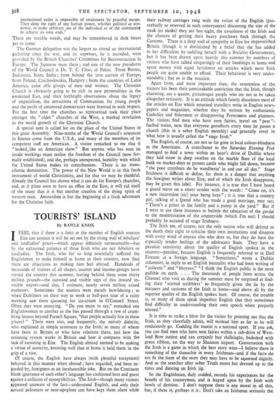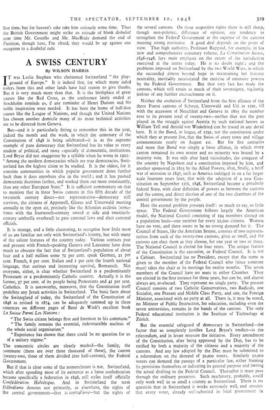TOURISTS' ISLAND
By RAWLE KNOX
IFEEL that if there is a limit to the number of English tourists Eire can contain it will be set not by the rising wall of hoteliers' and landladies' prices—which appear infinitely surmountable--but by the exhausted patience of those Irish who are not hoteliers or landladies. The Irish, who for so long resentfully suffered the Englishman to make himself at home in their country, now find there are objections to making him feel abroad. Hundreds of thousands of visitors of all shapes, accents and income-groups have visited the country this summer, leaving behind them some thirty million pounds—the outward and visible sign of this inward in- visible export—and also, I estimate, nearly seven million raised eyebrows. Sometimes the tourists were merely bewildering ; as when Dubliners on their way to work at half-past nine of a rainy morning saw them queueing for ice-cream in O'Connell Street. Often they were annoying. " Do you mean to say," remarked one Englishwoman to another as the bus passed through a row of crum- bling houses beyond Parnell Square, "that people actually live in these places? " There were also, and frequently, the naively didactic, who explained in simple sentences to the Irish, so many of whom have been to Britain or who have relations there, just how the rationing system works in Britain and how it compares with the lack of rationing in Eire. The English abroad seemed to be making a virtue of austerity, knowing well that at home it held them in the grip of a vice.
Of course, the English have always (with plentiful exceptions) behaved in this manner when abroad ; have regarded, and been re- garded by, foreigners as an inexhaustible joke. But on the Continent blank ignorance of each other's language has cushioned host and guest against a collision of susceptibilities. The Irish—though many visitors appeared unaware of the fact—understand English, and only their natural politeness or near-apoplexy can have kept them silent while
their railway carriages rang with the voices of the English (pro- verbially so reserved in such conveyances) discussing the size of the steak (or steaks) they ate last night, the casualness of the Irish and the chances of getting their heavy purchases back through the Customs. There is a deep well of sympathy in Eire for impoverished Britain (though it is diminished by a belief that she has added to her difficulties by saddling herself with a Socialist Government), but it has been drawn upon heavily this summer by numbers of visitors who have talked unsparingly of their hardships at home and spent money with equal lavishness on articles which most Irish people are quite unable to afford. Their behaviour is very under- standable ; but so is the reaction.
Apart from, and more important than, the ostentation of the visitors his been their unmistakable conviction that the Irish, though charming, are a quaint, picturesque people who are not to be taken altogether seriously. It is an attitude which faintly discolours most of the articles on Eire which returned travellers write in English news- papers and magazines, whether they be written by enthusiastic Catholics and fishermen or disapproving Protestants and planners. The visitors find men who have seen fairies, travel on " peat "- fuelled trains, note that everyone genuflects every time he passes a church (this in a sober English monthly) and generally revel in what here is usually called the " stage Irish."
The English, of course, are not so far gone in local colour-blindness as the Americans. A contributor to the Saturday Evening Post managed to find a town within an hour's drive of Dublin where they laid straw in deep swathes on the marble floor of the local bank on market-days to protect cattle who might fall down, because " the poor craythurs do be wandherin', in and out all day." Stage Irishness is difficult to define, for there is a danger that anything the foreigner writes about Eire, and of which the Irish disapprove, may be given this label. For instance, it is true that I have heard a guard move on a street vendor with the words: " Come on, it's a new innavotion (sic) your being here " ; it is true that a country girl, talking of a fiend who has made a good marriage, may say, " There's a priest in the family and a pump in the yard." But if I were to use these instances to belittle the education of the gcrrdai or the modernisation of the countryside (which I'm not) I should probably be accused of stage Irishness.
The Irish are, of course, not the only nation who will defend to the death their right to criticise their own institutions and disagree with every word of anyone else who does so, but they do have the especially tender feelings of the adolescent State. They have a peculiar sensitivity about the quality of English spoken in the country—peculiar, because English is frequently referred to in Dail Eireann as a foreign language. " Sometimes," wrote a Dublin columnist, in reply to an English journalist who had been writing of " colleens " and " blioyoes," " I think the English public is the most gullible on earth. . . . The thousands of people from across the Channel who visit us during the summer must be surprised at find- ing their ' starred scribblers' so frequently given the lie by the manners and customs of the Irish at home—and above all by the superior quality of the English spoken here. Of course, the trouble is, so many of them speak imperfect English that they sometimes find difficulty in understanding their own speech when properly uttered."
It is time to strike a blow for the visitor by pointing out that the Irish, as they cheerfully admit, will mislead him as far as he will credulously go. Codding the tourist is a national sport. If you ask, you can find men who have seen fairies within a cab-drive of West- land Row station arid can certainly buy shillelaghs, bedecked with green ribbon, on the way to Shannon airport. Conversation with the Irish is a game in which the best story wins—I believe there is something of the shanachie in every Irishman—and if the facts do not fit the form of the story they may have to be squeezed slightly. And so the searcher after sober Truth meets her dressed up to the nines and dancing an Irish jig.
So the Englishman, duly codded, records his experiences for the benefit of his countrymen, and is leaped upon by the Irish with howls of derision. I don't suppose there is any moral in all this, but, if there is, perhaps it is : Don't take an Irishman seriously the first time, but for heaven's sake take him seriously some time. Thus the British Government might strike an attitude of blank disbelief next time Mr. Costello and Mr. MacBride demand the end of Partition, though here, I'm afraid, they would be up against one exception to a doubtful rule.



































 Previous page
Previous page